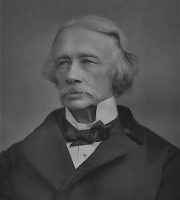About Coventry Patmore
Coventry Kersey Dighton Patmore (Woodford, 23 July 1823 - Lymington, 26 November 1896) was an English poet. In 1844 he published his first collection of poems, entitled Poems, which, however, did not collect positive reviews from critics. The most famous of his poetry collections was The Angel in the House, which, he dedicated to his first wife, Emily Andrews, with whom he had six children. In this book, he exemplified: the quintessence of the Victorian creed in the strategic clear separation of the feminine from the masculine sphere, of the domestic from the public space, of self-abnegation from self-affirmation. Through this poem, he had a clear influence on the conception of the ideal woman in Victorian society.The sentimental experience with his first wife also found space in all his following verses later, such as those included in the collection The Unknown Eros and the others Odes published in 1877, which presented a complex and thematic style and which focused on mystical aspects. Some commentators believe that this book contains his finest poetic work. After Emily's disappearance, he met Marianne in Italy, whom he would marry, converting to the Catholic religion in 1862. His second wife also did not survive and she died in 1880; Patmore remarried a third time, with the governess of the children. In 1895 he completed The Road, The Root, and the Flower, a mature collection of maxims and aphorisms. He also published The Espousals, (1856), Faithful for Ever, (1860), and The Victories of Love (1862).
In 1878, he published Amelia, his own favourite among his poems, together with an essay on English Metrical Law. This departure into criticism continued in 1879 with a volume of papers entitled Principle in Art, and again in 1893 with Religio Poetae.
Patmore died in 1896 in Lymington. He was buried in Lymington churchyard.
Browse all poems and texts published on Coventry Patmore
I have written little, but it is all my best; I have never spoken when I had nothing to say, nor spared time or labour to make my words true. I have respected posterity; and should there be a posterity which cares for letters, I dare to hope that it will respect me.









